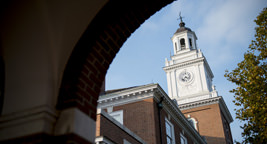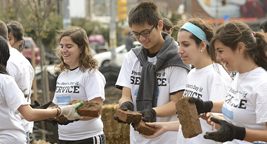Individual Excellence
Since its founding as America’s first research university, Johns Hopkins has defined the modern American institution of higher education. The university is committed to a simple premise: that it is the best place in the world to grow, discover, and achieve. To continue that legacy, the institution must attract the most talented minds and, once they are here, help them realize their full promise.
For our students, this means unparalleled opportunities for intellectual growth and accomplishment and connections to teachers, mentors, the community, and one another. For our faculty, it means an intellectual environment that supports bold innovation, freedom of thought, collegiality and discovery, and the relentless pursuit of excellence. And for our staff, it means a workplace that respects their contributions and provides meaningful opportunities for professional development and advancement.
The Goals
Build Johns Hopkins’ undergraduate experience so it stands among the top 10 in the nation.
Known for their independent spirit and daring intellect, our undergraduates use their time at Johns Hopkins not only to learn but to experiment, to challenge, and to push past established boundaries in a wide range of endeavors. A strong undergraduate program casts a broad halo over our entire university. Our goal is to build ever stronger and deeper connections among these enterprising minds: with each other, with their faculty, with the neighborhoods around our campuses, and with the rest of the university.
Following the Ten by Twenty, the undergraduate program has seen new investments and successes in areas as diverse as the introductory science curriculum, spaces for education and research, and academic support services. And it has welcomed an incoming class that is the most selective, the most diverse, the most international, and the academically strongest in the university’s history. In 2015, the university will be working on a wide range of initiatives that are designed specifically to build the undergraduate experience and connect our students to one another, on campus and off.
Build on our legacy as America’s first research university by ensuring that at least two-thirds of our PhD programs stand among the top 20 in their fields.
Reimagining the European university on American soil, Johns Hopkins became the model on which all other American research universities were built. Doctoral education is a defining feature of our legacy and, as such, must command the attention of our schools and our entire community. We will chart a strategy on graduate education that not only aspires to best practices but defines those practices.
This past year and a half, our university advanced a number of ongoing initiatives for innovations in graduate education. Our schools expanded their unique graduate teaching fellowships; a cross-divisional committee completed a report on the future of PhD education; and faculty, staff, and students from across the university finished their first year of work on pilot projects to reshape PhD education. And yet in candor, if we hope to truly drive pioneering change in graduate education, we will need to focus our efforts on carrying forward and amplifying these efforts in the coming year.
Attract the very best faculty and staff in the world through a welcoming and inclusive environment that values performance and celebrates professional achievement.
The university’s faculty and staff are the bedrock of our institution, grounding our research, teaching, and service. More than any other factor, our ability to attract, support, and, perhaps most importantly, retain faculty and staff will determine our future for decades to come. We must commit ourselves to practices, programs, and ethos so we are able to recruit faculty and staff who honor the standards of our best.
Since the launch of the Ten by Twenty, the university invested in areas such as new child care facilities, and expanded its faculty mentoring programs. In 2015, the university will continue to grow its support, building on existing initiatives and launching new ones in areas such as early career faculty, diversity initiatives, and marriage benefits—all aimed at creating an environment that makes faculty and staff want not just to begin their careers at Hopkins but to finish them here.



